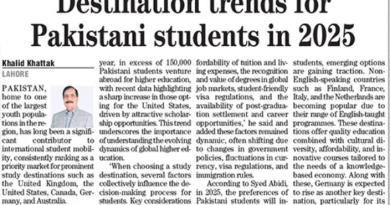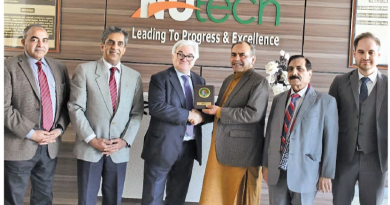What parents need to know and what schools should do to help!
By Syed Abidi (TI)
Education Expert & Career Counsellor
I had the opportunity of participating in an event last Saturday organized by a well known group of schools at their branch in Lahore. They have introduced IB (international Baccalaureate) system recently and are now an authorized center.
The event was basically designed as an information workshop by the management with the marketing theme of this new system titled “Finding The Best Educational Fit for Your Child” IB is becoming popular in Pakistan and the trend is increasing since its debut in 1996 from Karachi.
First of all I would like to acknowledge and appreciate their initiative for organizing such a wonderful, interactive and informative event as expected from such a well established and one of the largest groups of schools in Pakistan.
I kept on listening with interest to a very highly qualified panel which comprised of those who were promoting IB as a more innovative and effective education system and those who had very little information on what IB does to the students except for what they have gathered from the information available. The moderator a well known TV anchor was trying his best to follow the theme and draw a conclusion from the panelists and through the Q&A session in how IB can bring wonders to the millennials and youth in pursuing their higher education in Pakistan or abroad. The Q & A session at one stage took an awkward turn with parents asking to one of the panelists from LUMS how many students of IB are enrolled at LUMS? would he guarantee admission to IB students?
I have been counselling students from more than 22 years and had the opportunity of evaluating and assessing various qualifications both in Pakistan and abroad. Having advised more than 15,000 students in finding the best fit and most appropriate subject areas, universities and destinations at all levels, I wanted to intervene and express to clarify many of the points that were raised. I also wanted to identify some core elements and factors that play a key role in the decision of selecting the most suitable education system and pathway as an entry requirement for a university degree instead of debating or comparing the different education systems or pathways.
Unfortunately I did not get time and the workshop concluded in failing to identifying the real issue that was under discussion. The main objective was defeated as the decision regarding selection of the best fit education system for a child is not based on an education system that is more innovative, effective or popular but has to be decided by a thorough evaluation and assessment from his/her performance in the early years to the middle years that comes under the domain of a professionally trained and academically qualified counsellor through regular cosunelling sessions. A phenomenon that is either non-existent or very seldom found in Pakistani schools as compared to the west. They key questions should have been:
- Why should a child choose CIE or IB or the National Curriculum?
- Who is the best and the most appropriate person to advice parents and children?
- Which is the right year or point between EYP (early year program) and MYP (middle year program) when this decision should be taken? Decision of choosing a particular education system?
Since the topic and the questions raised were very relevant to my profession and similar to those that I receive from students and parents everyday in response to my columns that I write for newspapers. I felt obligated in writing this article with a view to help students and parents to understand not only different education systems but the factors that are important and contribute when making the decision of choosing a particular education system for their children.
Let us review the three main education systems that are currently available to our students in Pakistan which lead to their undergraduate degrees here or abroad.
The National Curriculum: that is offered by the federal board and all the provincial boards in Pakistan (10+2) the 10th grade (Matriculation) and the fellow of the arts or science (FA, FSc) more often called intermediate/12th grade.
In 10th grade the students tend to pickup any of the streams from science, humanities or technical group which leads to the 12th grade or intermediate where the students subsequently follow a relevant subject combination such as pre-medical, pre-engineering, computer science or humanities for entry to respective undergraduate degrees.
Most countries in the west for example: USA, Canada, Australia & EU tend to accept the 12th grade qualifications as entry to their undergraduate degrees depending on grades achieved and or other prerequisites. However, in the UK a very limited number of universities will consider the Pakistani 12th grade as the entry requirement to their 3 years honors degree which has a minimum entry requirement of A-Levels (13th year of qualifications). They claim that the students of 12th grade in Pakistan do not reach the required depth in their core subject areas as compared to their counter parts the A-level students. However, many Pakistani students with intermediate have performed well when given a chance to pursue an undergraduate degree in UK.
The 12th grade syllabus is mostly textbook based and therefore, it does not offers some of the innovative and other learning benefits associated with the CIE or IB. Having said that many schools in Pakistan have adopted a better teaching methodology and have introduced modern teaching philosophy in classrooms within the Pakistani curriculum. The most prominent in this Is the Agha Khan Board or School System a National Board of Intermediate and Secondary Education that offers qualifications in both English and Urdu for Secondary and Higher Secondary School Certificate. Their methodology of teaching have helped to improve the quality of education across Pakistan by making examinations of reputable standards more accessible to students and increasingly valued by leading higher education institutions within and outside the country.
The CIE: Cambridge International Examination (O & A-Levels) the second most popular education system in Pakistan which has seen a sharp rise in the past two decades and is offered by almost all English medium elite schools and groups. The system offers broad knowledge based learning skills, investigative skills, recall of knowledge, problem solving, initiatives, oral skills, team work and finally preparation for employment. Though, the system claims a very strong and effective teaching methodology, it is shocking to see a large number of tuition centers with booming business in providing tuition to these students across country.
IB (international Baccalaureate) diploma: Founded in 1968 in Geneva, Switzerland it is a system that aims to provide uniformity for the children of expats that are on the move, living and working abroad. No doubt it’s a premier worldwide educational system covering more than 140 countries and servicing nearly a million students between the ages of 3 to 19.
The IB learner philosophy/profile claims to develop internationally minded people who recognize their common humanity and share guardianship of the planet helping to create a better and more peaceful world. The teaching methodology revolves around 10 key areas that IB learners strive to be: INQUIRERS, OPEN MINDED, KNOWLEDGEABLE, CARING, THINKERS, RISK TAKERS, COMMUNICATORS, BALANCED, PRINCIPLED, REFLECTIVE.
IB has 3 main programmes which lead to the undergraduate entry to any international or local university (*subject to equivalence). EYP (Early Learning Programme 3-12) MYP (Middle Years Programme 11-16) Diploma Programme (16-19) The Diploma programme is graded over 45 points giving ample scope to differentiate student ability and assessment includes both final examinations and internal assessment undertaken by the teacher and then externally moderated by the IB. Where students study subjects such as: language and literature, Science, Mathematics, Design, Arts, Physical & health Education and Language Acquisition.
Above we have reviewed and visited all the main education systems and have identified their core values and philosophy. Now the most important question the parents need to ask which is the best among the three?. The answer to this is it will vary from child to child and shall depend on how the child will respond to the following:
Classroom behavior, learning curve, interaction with classmates, ability to remember and recall, thinking and problem solving skills, communication skills, social habits, confidence level, likes and dislikes, family history and above all whether he wants to study in Pakistan or wish to proceed abroad.
The above are to be assessed and monitored at regular intervals by a trained, academically qualified career counselor, one that fully understands not only the education system available but have the ability to guide the students and parents for the most suitable education system that the child would be able to cope and deliver results that are expected. This means that schools offering such education systems will have to hire qualified counselors, as teachers may NOT be able to deliver the task no matter how good and qualified they are.
No doubt the schools in Pakistan are doing their best in bringing more study options and pathways for student community which will open up new avenues for them to explore better international study opportunities. However, these schools will have to market such courses using marketing ethics that is beyond branding and packaging, as parents of today are becoming more aware and inquisitive regarding their child’s education especially due to huge financial commitments involved. Schools in Pakistan should focus on providing improved career counselling and establish proper units to provide parents assessment and evaluation of their children delivering them an unbiased advice on the most appropriate and “THE BEST FIT EDUCATION SYSTEM FOR THEIR CHILD”.





